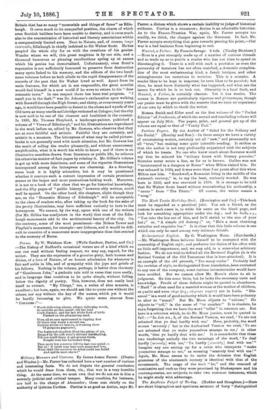censorship of English style, and performs the duties of his
office with no little self-importance, and, we may add, in a somewhat arbitrary fashion. We do not wish to defend all the Revisers' English (it is the Revised Version of the Old Testament that is here attacked). It is an example of the old proverb, "Too many cooks." Probably had the revision of style, as distinguished from translation, been entrusted to any one of the company, some curious inconsistencies would have been avoided. But we cannot allow Mr. Moon's claim to sit in judgment. He hits some blots, but he lacks the necessary taste and knowledge. Proofs of these defects might be quoted in abundance. " Maid " is often used for a married woman or the mother of children, as paella and even Virgo (e.g., virgines nupt,e) are in Latin. "Dis- annul" is a word of good authority which it would have been pedantry to alter to "annul." But Mr. Moon objects to "unloose." He objects to "tell," in the sense of "to number." It is obsolete, he says, forgetting that we have the word " teller " in common use. But here is a criticism which, to do Mr. Moon justice, must be quoted in full : —"In Job xix., 3, of the Revised Version, we read, Ye are not ashamed that ye deal hardly with me.' Here, probably, the word means ' severely ;' but in the Authorised Version we read, Ye are not ashamed that ye make yourselves strange to me ;' in other words, that ye hardly deal with me.' It is remarkable that these two renderings embody the two meanings of the word, Ye deal hardly [severely] with me,' 'Ye hardly [scarcely] deal with me.'" Imagine any one setting up for a critic who interprets "make yourselves strange to me," as meaning "scarcely deal with me !"
Again, Mr. Moon seems to be under the delusion that English grammar of the nineteenth century is identical with that of the
seventeenth. The usage of the verb "be," and the concord of nominative and verb as they were practised by Shakespeare and hie contemporaries, are subjects, to take two common instances, which he might study with advantage.
















































 Previous page
Previous page